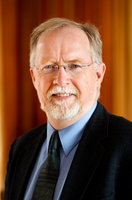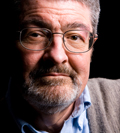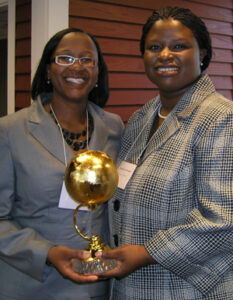Dr. David Kelley, Geography Department, College of Arts and Sciences, had an online interactive map published recently by the Highpointers Club. The club was formed to provide support to climbing enthusiasts who wish to summit the highest peak or hill in each of the 50 states. Kelley’s scalable topographic map displays the locations of the highest point in elevation in each state, with selectable pop-ups that show tables of elevation, GPS coordinates and Wikipedia links to valuable information on each peak. It can be accessed here.
Dr. Robert Kennedy, Catholic Studies Department, College of Arts and Sciences, is the author of the chapter "Human Development and Business Practice," published in Human Development in Business: Values and Humanistic Management in the Encyclical 'Caritas in Veritate,' Domenec Melé and Claus Dirksmeier, eds., London: Palgrave-Macmillan, 2012, pp. 137-154. Kennedy also had one of his books, The Good that Business Does, published in a special edition of PovertyCure, "an international coalition of 180-plus organizations and individuals committed to entrepreneurial solutions to poverty that challenge the status quo and champion the creative potential of the human person."
Dr. Michael Naughton, Catholic Studies Department, College of Arts and Sciences, presented a lecture on "The Vocation of the Business Leader: A Document from the Pontifical Council for Justice and Peace," Dec. 12, at the Catholic University of the Sacred Heart in Rome.
Dr. Scott Wright, History Department, College of Arts and Sciences, is the author of a new book, Of Snapping Turtles and Packing Plants. The work, which combines fiction, history and memoir, is an account of growing up in South St. Paul during the 1940s and early 1950s. Copies are available at the UST Bookstore on the St.Paul campus.
This fall, the Community Justice Project (part of the Interprofessional Center for Counseling and Legal Services), led by Nekima Levy-Pounds and Dr. Artika Tyner, both of the School of Law, has partnered with media justice advocates to advance the prison phone justice campaign. The campaign focuses on addressing the high cost of prison phone calls both nationally and locally. CJP students, Dominika Malisz, Elysia Newton and Margaret Higgins also have played a key role in mobilizing and educating key stakeholders related to prison phone justice reform. Malisz, Newton and Higgins conducted legal research and analysis, met with policy officials, hosted listening sessions and developed outreach materials. As a result of their efforts, Congressman Keith Ellison sent a letter to Federal Communications Commission chair to advocate for reform. The CJP is an award-winning civil rights clinic that focuses on promoting equal justice under the law.
Dr. Artika Tyner serves on the Emancipation Proclamation Committee with the Minnesota African American Museum (MAAM). The Office of Diversity and MAAM have partnered to celebrate the 150th Anniversary of the Emancipation Proclamation.
In addtion, Tyner and Beatriz Espinoza, a second-year law student, are the creators of "A Brief Guide to Watch Night Services," which serves a tool for educating the community on the history of the Watch Night Service held during the wake of the Emancipation Proclamation. This year marks the 150th anniversary of the issuance of the Emancipation Proclamation and convening of the Watch Night Service referred to as “Freedom’s Eve” (dated: December 31, 1862). Freedom’s Eve marked the beginning of a new chapter in African American history as slaves seized the opportunity to gain their freedom.
This guide provides a brief history of this historical Watch Night Service and explores the significance of this service in relation to the abolishment of slavery in the United States. It also includes practical tools for celebrating freedom’s journey today. Our hope is that members of the UST community can share in this historic celebration by honoring the lives of those who fought for freedom and renewing your commitment to pursue justice, freedom and liberty.










